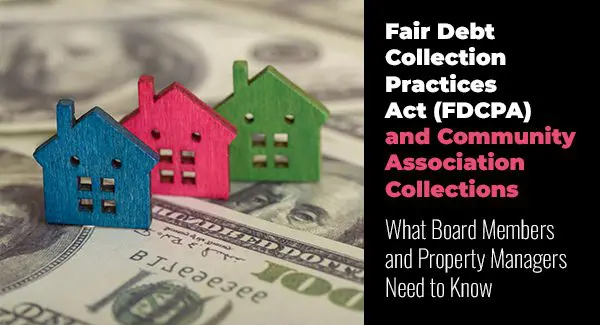- Legal Updates, Board Member 101, Finances
- Wisconsin, Indiana, Illinois, Florida
The Fair Debt Collection Practices Act (FDCPA) is a federal law enacted in 1977 to protect consumers from abusive, deceptive, or unfair debt collection practices. Enforced by the Consumer Financial Protection Bureau (CFPB), the FDCPA outlines strict rules for how third-party debt collectors must operate when attempting to collect debts from individuals, including homeowners in community associations such as condominium, homeowner (HOA), and townhome community associations.
While community associations themselves are typically not considered “debt collectors,” their legal representatives (e.g., attorney, third-party collection agency) are. That means when an association turns over delinquent assessments to a collection firm, those collection efforts must comply with the FDCPA. Failure to do so can involve legal risks, including fines, penalties, and reputational damage.
Below, we break down key FDCPA provisions and provide practical guidance for board members, property managers, and community leaders on avoiding violations while effectively managing delinquent assessments.
Common FDCPA Violations in Community Association Collections
The Consumer Financial Protection Bureau (CFPB) receives tens of thousands of consumer complaints annually, involving violations of the Fair Debt Collection Practices Act (FDCPA). For community association collections, some common claims include:
- Attempting to collect a debt not owed (e.g., incorrect balances)
- Failure to provide proper written notice verifying the debt
- Threatening legal action that is not intended or allowed
- Harassment or repeated calls to consumers
Understanding these frequent violations is essential for associations and their legal representatives to minimize liability and ensure that all collection practices comply with federal law.
What Happens If a Claim Is Filed?
If a community association homeowner files an FDCPA claim, they must prove:
- They are a “consumer” under the Fair Debt Collection Practices Act (FDCPA)
- The debt was for personal or household purposes
- The defendant is a “debt collector”
- A specific FDCPA provision was violated
Because the consumer bears the burden of proof, associations and their collection partners must maintain thorough documentation and compliance protocols to defend against potential FDCPA claims.
Avoiding FDCPA Pitfalls: Best Practices
Community association attorneys and managers should take these steps to avoid triggering FDCPA violations:
- Use a vetted demand letter that complies with the CFPB’s Model Validation Notice.
- Verify debt accuracy before making contact by reviewing ledgers
- Respect communication limits (e.g., call times and frequency)
- Treat all association members with respect and explain debts clearly
By following these practical steps, community associations and their attorneys can pursue delinquent assessments while reducing the risk of costly legal challenges and maintaining trust with homeowners.
Legal Resource
For community associations, recovering delinquent assessments is necessary to fund maintenance, utilities, and essential services. However, when third-party attorneys or agencies are involved, the method of collection must strictly comply with the FDCPA.
To minimize risk:
- Work with experienced legal counsel
- Use FDCPA-compliant forms and notices
- Ensure transparency, fairness, and accuracy in all collection efforts
When done correctly, associations can collect what they’re owed while respecting homeowners’ rights and avoiding costly litigation.
Questions about FDCPA compliance, delinquent assessment recovery, drafting/revising your association’s collection policy, or other legal concerns?
Please call 855-537-0500 or visit www.ksnlaw.com.
Since 1983, KSN has been a legal resource for condominium, homeowner, and townhome associations. Additionally, we represent clients in real estate transactions, collections, landlord/tenant issues, and property tax appeals. We represent thousands of clients and community associations throughout the US with offices in several states including Florida, Illinois, Indiana, and Wisconsin.
Please note that the material contained in this article is for educational and informational purposes only and does not constitute legal advice. No attorney-client relationship is established by your review or receipt of the information contained in this article. You should not act on the information discussed in this article without first obtaining legal advice from an attorney duly licensed to practice law in your State. While KSN has made every effort to include up-to-date information in this article, the law can change quickly. Accordingly, please understand that information discussed in this article may not yet reflect the most recent legal developments. Material is not guaranteed to be correct, complete, or up to date. KSN reserves the right to revise or update the information and statements of law discussed in the article law at any time, without notice, and disclaims any liability for your use of information or statements of law discussed on the article, or the accessibility of the article generally. This article may be considered advertising in some jurisdictions under applicable law/s and/or ethical rules/regulations. © 2025 Kovitz Shifrin Nesbit, A Professional Corporation.



